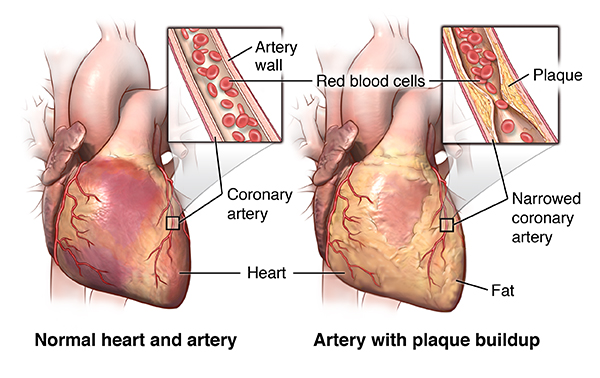Heart bypass surgery is one of the most common surgeries performed in the all over the world. It is commonly referred to as coronary artery bypass grafting (CABG). A bypass is created using a healthy artery or vein from another part of your body. The blood vessel is connected to a diseased blood vessel near the heart to create a new path around the blocked area. Heart bypass surgery is performed when arteries that carry blood to the heart muscle are blocked or narrowed.
Has your doctor advised you to undergo bypass surgery? You must be thinking about the after-effects. Worry not, for we have got you covered.
What Is Coronary Heart Disease?
If a generic definition helps, Coronary heart disease is a blood vessel associated disease that involves narrowing of blood vessels, which is mainly caused by atherosclerosis.
Atherosclerosis is the deposition of plaque (cholesterol, fat, etc.) in the lumen(cavity) of the coronary artery. Ultimately, it hinders oxygen supply to the heart by limiting its blood supply. If CAD or Coronary Artery Disease reaches a severe level, doctors recommend Heart Bypass Surgery. However, there remain some undeniable complications that one may have to face after a heart bypass surgery. The scope of this article is to cover the undeniable complications after a heart bypass surgery, to live a healthy life ahead.
Source: Johns Hopkins Medicine
An obvious question that needs an answer is, what is the need for bypass surgery?
The blockage of the artery causes the cardiac muscles to starve for oxygen. It alters the heart rhythm, can cause angina pectoris (severe chest pain), myocardial infarction(heart attack) and sometimes death. To prevent such nightmare-inducing situations, any doctor in a heart hospital in India would suggest heart bypass surgery.
What Are Some Complications After Heart Bypass Surgery?

Source: HartFord Healthcare
1. Blood loss immediately after surgery:
After all, it is open-heart surgery. Heart bypass requires the doctors to incise the skin and cut open the sternum(breast bone) to make the graft. Bleeding occurs, and some amount of blood is lost. The volume of blood maybe a few hundred cc’s. Bleeding is handled by medical equipment until coagulation completes. If the coagulation takes too long, it may be a piece of bad news. A longer time for coagulation means more blood loss.
Also Read: 7 Health Tips for Expecting Mums
2. Chest Wounds:
Chest wounds can be a major postoperative problem for a person with recent surgery. It can challenge the patient physically as well as mentally. Mostly, incision wounds take 2-3 months to heal completely. Until then, one must take care of minor things.
The following measures can help in case of severe chest wounds:
- Do not rub the wounds
- Wash and wipe gently with a soft towel
- Adjust your sleeping position so that your wounds don’t get worse.
- Go for air drying.
After surgeries, a lot of doctors give some instructions to deal with incisions. Religiously follow such medical instructions for a speedy recovery.
3. Pneumonia
One of the most feared postoperative complications pneumonia accounts for affecting 33% of the patients post-surgery. Now, there are some solid reasons for this. One and the first reason is surgery anxiety. You must be familiar with the fact that anxiety and stress drive the immune system weak. Plus, the patient is susceptible to bacteria like Pseudomonas that have a high chance of inducing Pneumonia.
One may ease this Postoperative Pneumonia by:
- Strictly following doctor’s instructions.
- Avoid drug abuse and smoking.
- Doing moderate exercise.
- Managing stress.
- Maintaining good hygiene.
Also Read: 6 Medical Conditions Cannabis Can Improve
4. Atrial fibrillation
Atrial Fibrillation or (AFib) affects around 40% of the patients who undergo open-heart surgery. The main reason for atrial fibrillation being a postoperative disease is the inflammation in the chest. Atrial Fibrillation is a type of irregular heartbeat that can lead to fatigue, palpitation and weakness. Usually, when the heart rhythm changes, it comes back to normal after a little bit of rest. However, if it doesn’t, calling your doctor should be your next move. By exercising, meditating(controlling your breath) and regulating your sleep schedule, you may prevent your chances of getting an Atrial Fibrillation.
5. Cognitive Problems
Especially senior citizens. Though the problem disappears within weeks in young patients, the seniors may take some time to recover. A slight effect on memory occurs in the patients after open-heart surgery. During the surgery, the heartbeats are stopped by certain medications, and a heart-lung pump is used for the oxygenation of the blood. This heart-lung pump successfully does its job but affects brain function to a certain extent.
Also Read: Ways to Stay Safe While Seeing Your Doctor Amid COVID-19
Final Word
Those were 5 of the common complications one may face after a heart bypass or open-heart surgery. Note the fact that they are not inevitable but hold a high chance of happening. Make sure you get your surgery done from the best heart hospital in India.
READ MORE: Funny rock and roll memes
READ MORE: The book that will forever change our ideas about the bible
READ MORE: Jsp servlet interview questions


